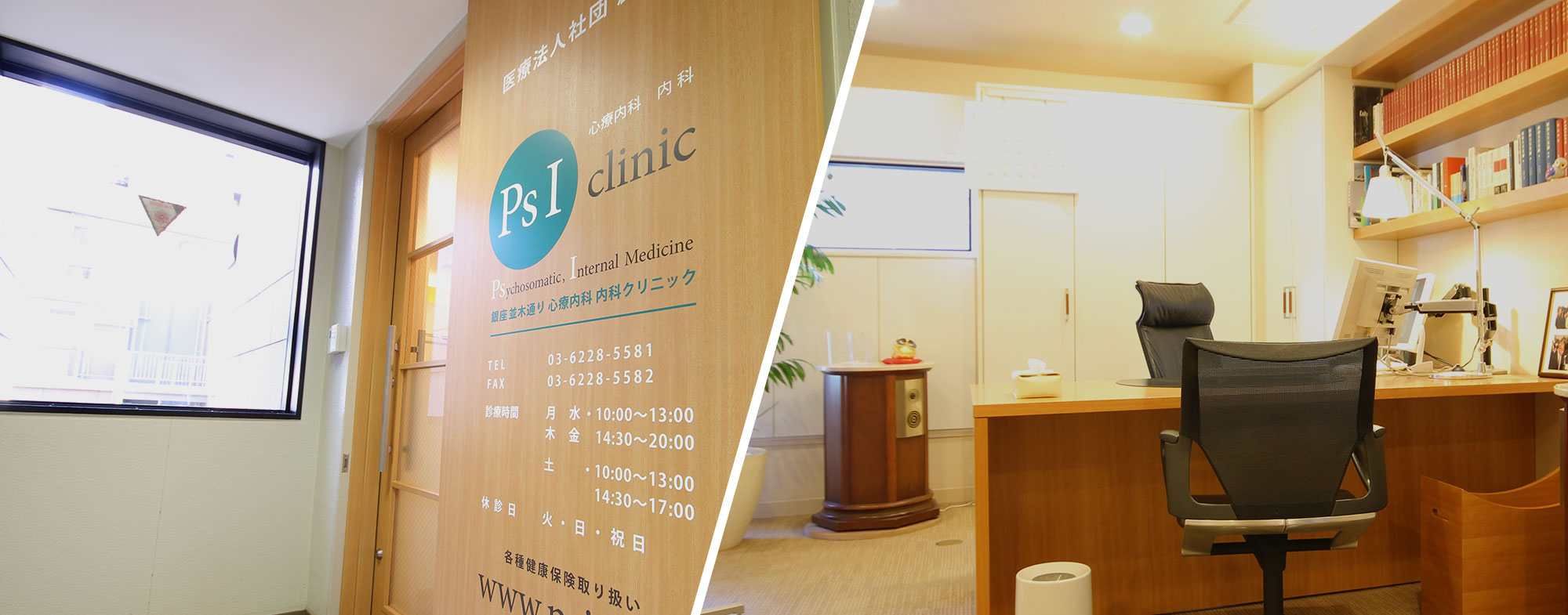PSI (Psychosomatic & Internal Medicine) clinic
President - Hajime Kimura
| Hometown | Tokyo |
|---|---|
| Year of birth | 1949 |
| Location | Ginza, Chuo-ku, Tokyo |
| Founding year | 2010 |
| Industry | Psychosomatic medicine |
Listen to voice of patients' heart and open the way to a bright future.
PSI is a clinic for patients who have mental and physical problems, such as depression, panic disorder, or obsessive-compulsive disorder. We help patients take back their happy lives by encouraging them to talk about their concerns and finding keys to solutions. We always try hard to share in their pain and problems. Examining patients and enabling them to go back to a happy life is a long process. At the same time, the process is a precious experience enabling me to get to know the meaning of life, seeing my patients smile.
Our psychosomatic medicine clinic was opened in Ginza in 2010. I had experienced many things before I became a specialist in psychosomatic medicine.
I first majored in economics at university. I decided to be a lawyer or a medical doctor because I didn't want to be just another company employee. I elected to be a medical doctor because I wanted to set a bigger challenge for myself. After hardship and endeavor, I graduated from the University of Tokyo Graduate School of Medicine and married with my wife, who is also a medical doctor. Then, we left Japan for Chicago in the U.S.A, where I worked as a physician. We had planned to live there for a while at first, but I returned to Japan to take over a medical device manufacturer that had been run by my wife's father until he became ill. I managed the business for over ten years while working as a physician occasionally.
However, I resumed my career as a clinician because a national tax had been used to make me a medical doctor, and I wanted to repay the Japanese people for that as a physician. I made a fresh start as a nephrologist, examining patients with kidney disease and those undergoing dialysis. I cannot imagine how painful it is for patients to continue treatments that take three to four hours each time throughout their life. I thought I couldn’t support them enough as a physician unless I was able to understand their feelings and alleviate their suffering. So, I began to study psychiatry, the first step to opening a psychosomatic medicine clinic.
Medical doctors should comprehensively examine both the mental and physical condition of patients. On one hand, now, excellent doctors offer specialized medical services while always taking care of patients' minds. On the other hand, medical professionals tend to place less importance on mental support as treatment is getting more specialized through amazing advancements in medicine. The problem of pain is not limited to the pain itself, but, in reality, patients suffer from accompanying fear and anxiety. I treat an overwhelmingly large number of depressed patients.
The economy has become stagnant, and many adults suffer because they cannot imagine a bright future, even though today's society is materially rich and you can get almost anything you want. Watching this tide, young people worry about their future. The most common patient profile at our clinic is females around 30 years old. They are at a loss for their identity, concerned about their work and personal relationships.
I help them find an optimal solution. The optimal solution varies individually because patients have different genetic backgrounds and growth environments. I don't pursue universality or appropriateness, or advance treatments for the average patient.

In this, I try to help patients understand their own situation and understand what their problems are by asking about their problems as precisely as possible. It is important for them to understand themselves while talking with me, as I act like a mirror. I never try to convince them or force conclusions.
It takes a very long time for patients to prepare themselves and talk about their problems. My ideal treatment is one where patients can understand their situation and progress toward resolution after working through the process. I always try to face their suffering together with them to find solutions together. Patients will open up their minds if I am able to successfully convey my message. Many of my former patients come to see me and tell me about their marriages or childbirth after they have completed treatment.
Recently our clinic has received more patients from overseas. The hospital search sites for non-Japanese patients include our clinic because I'm an English speaker. We also have many patients from remote places inside or outside Japan. My way of treating patients is always the same: if I can converse with a patient many times, I will find his or her problems and get to know the causes.
Sometimes, I tell my patients to look closely inside themselves when asking about their problems. Foreign patients are surprised, hearing it. Looking is to look at something in front of or beyond them. They have no idea of looking inside themselves and get puzzled. Then, they ask me if it is a Zen idea. It's not quite so extreme, but I think my medical practice uses ideas that Japanese people have been familiar with since ancient times.
I try to create an atmosphere in the clinic that stimulates the five senses of patients. For instance, by burning incense and hanging pictures. Medical care starts when a patient opens the door of the clinic. We have to enable a smooth flow from reception, through examination, treatment, and payment, as well as creating a good environment in the clinic.
Our staff also need to contribute to creation of this comfortable atmosphere. It is necessary to keep a cozy atmosphere within the clinic. We will continue to work hard and make improvements to better medical care and support those who suffer, regardless of gender or nationality.



